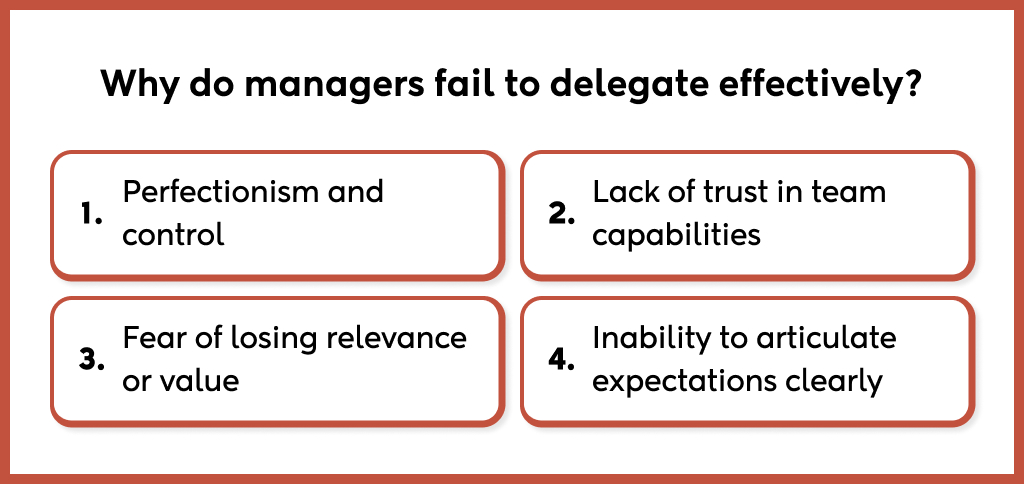Delegation is one of the most powerful skills that can help a manager save time and create space to focus on making high-impact decisions for innovation and growth. It also helps in building stronger and more capable teams by empowering them to take ownership and accountability for their tasks. Yet, so many managers struggle with it. Some are unsure what to hand off, while others have no idea when to step back.
Delegation is a skill you can build step by step, and every deliberate attempt at it makes you better at it. With intentional practice, delegation becomes a core management skill that helps you save time and lets you rely on your team instead of carrying everything yourself.
According to a Gallup study, CEOs who excel in delegating generate 33 percent higher revenue. They don’t do everything themselves; they empower their teams by giving them ownership. By handing off ownership instead of just tasks, they create space to focus on what truly matters: high-impact decisions, innovation, and growth.
This guide walks you through six practical steps to develop your delegation skills, from building the right mindset to continuously improving through reflection and feedback. Each step is designed to help you delegate with more clarity, confidence, and trust so both you and your team can thrive.
Steps that help you improve your delegation skills

Improving delegation is about intentional changes in how you assign work, communicate expectations, and support your team. The more consistently you practice it, the easier it becomes. These six steps will help you approach delegation with structure and clarity so you can rely on your team with confidence and free up time for the work that truly needs your attention.
Step 1: Build a delegation mindset
The first step is to recognize why you are hesitating to delegate. There could be several reasons for doing this, such as perfectionism, fear of mistakes, and skepticism about the team’s abilities. You need to change the way you think; your job is not to do everything by yourself. You need to achieve results through your team while developing their capabilities. When you delegate well, you invest in your team’s growth and get time to focus on strategic priorities that only you can handle.
Step 2: Learn to choose what to delegate
You don’t need to do everything by yourself; learn what can be done by your team with efficiency and effectiveness. You need to regularly audit your task list and the categories you work into: tasks ‘only you can do’, tasks ‘you can delegate with guidance’, and tasks ‘you can completely delegate’. Start small by delegating low-risk and repeatable tasks. This will eventually build your confidence and prove that delegation works without jeopardizing critical outcomes.
Step 3: Match tasks to the right people
Effective delegation means knowing your team. Take time to understand each person’s current skills, career interests, and readiness for new challenges. Assign tasks that stretch people slightly beyond their comfort zone and are challenging enough to promote growth but achievable with effort.
For example, if someone wants to build presentation skills, delegate an upcoming client update rather than routine data entry. This alignment ensures people feel motivated, not overwhelmed, and protects critical work from being assigned to someone unprepared.
Step 4: Provide necessary context and resources
Even the most capable team member can struggle if they don’t have enough information or access. Before handing off work, make sure they understand the background: why the task matters, how it connects to broader goals, and what success looks like. Share templates, examples, and the contacts they may need. Good delegation isn’t just about assigning the task, it’s about preparing them to do it well. If you’re delegating a report, instead of saying ‘please prepare the monthly report’, share last month’s version, explain the key insights leaders care about, and give them access to the data sources they need.
Step 5: Practice clear delegation conversations
When delegation is unclear, it creates confusion and rework. When you assign your work, you need to articulate desired outcomes, deadlines, priorities, and decision-making boundaries clearly. After explaining, ask the person to summarize their understanding. This simple step catches misalignments early and ensures you’re both working from the same playbook before work begins.
Step 6: Set ownership and accountability
Delegation is effective only when responsibility is clear. Define who owns the task and what checkpoints you expect. Ensure that they agree on the checkpoints such as reviewing the outline in two days and checking the first draft by the end of the week. Clear ownership also means they update you. So instead of you having to ask, “Any progress?” they know exactly when and how to share updates. When people understand they are the “driver” of the task, not just helping with it, they start taking more initiative and producing stronger results.
Step 7: Let go and support, not micromanage
Once you have delegated, resist the urge to oversee every detail. Allow people to approach the work in their own way as long as they meet agreed standards and deadlines. Set structured check-ins at key milestones (like a mid-point review) where you remove obstacles and offer guidance.
For example, schedule one 15-minute check-in halfway through a project rather than asking for daily updates. This balance shows confidence in their abilities while keeping you informed without stifling their autonomy.
Step 8: Reflect and improve after each delegation
Delegation gets better with feedback. After the task is completed, ask yourself: What went smoothly? Where was your communication unclear? Did you over-supervise or provide too little support? More importantly, ask your team member for their perspective—”Was my guidance helpful? What would have made this easier?” For instance, they might say they needed more context upfront or fewer check-ins. Use these insights to refine your approach next time, adjusting your level of detail, trust, and involvement.
Why do managers fail to delegate effectively?

Many managers want to delegate, but often hold back because it feels easier to do things themselves or worry about mistakes and losing control. Over time, these habits slow progress, create stress, and stop team members from growing.
Here are some of the most common reasons delegation feels difficult and how they impact the team.
1. Perfectionism and control
Managers believe no one can do the task as well as they can, so they hold onto work rather than accepting that work from others is often sufficient. This need for perfection becomes a barrier to team development and their own capacity.
2. Lack of trust in team capabilities
Managers underestimate their team’s abilities or haven’t invested time in understanding what people can handle. Without confidence in their team’s competence, they default to doing work themselves rather than risking potential mistakes.
3. Fear of losing relevance or value
Some managers worry that if they delegate their core work, they’ll become unnecessary or less valuable to the organization. They equate being busy with being important, so they cling to tasks as a way to prove their worth rather than focusing on higher-level contributions.
4. Inability to articulate expectations clearly
Managers struggle to break down and communicate what success looks like, leading to confusion and poor results. When early delegation attempts fail due to unclear instructions, managers conclude that delegation doesn’t work rather than recognizing their communication as the real problem.
Conclusion
Delegation is not just about handing off your work to others, but it is also about working smarter. When you share responsibility, you can focus on more important tasks which have a higher impact, such as making strategies, taking decisions that impact the organization’s growth. Delegation helps you become a leader who guides rather than carries everything alone. Like any other skill, delegation gets easier the more you practice it. You can start with small tasks, communicate clearly, and trust your team to learn and grow. You will definitely experience less stress, better teamwork, and get more time for planning, problem-solving, and decision-making.




























No Comments